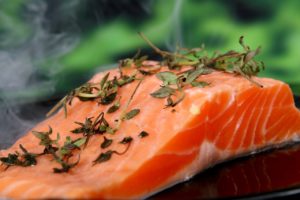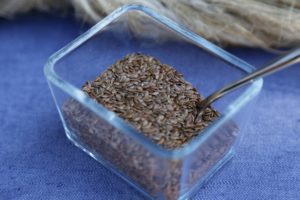What to look for in an Omega 3 Supplement
Fish oil is a rich source of EPA and DHA which are needed for our health for many reasons that will be listed in this article. These needed nutrients are found in the fatty tissue of cold water, oily fish. These are essential fatty acids and the body cannot make them thus we need to get them from food or supplement (1)
It has only been in the past 15 years that the actions of EPA and DHA have come to be understood. (3) Until now there is still more research on DHA than there is on EPA (2). Because of research we have a better understanding of how these fatty acids work in isolation and in combination.
This article will discuss the benefits of both EPA and DHA and ways to get them in your diet including vegan sources.
Do You Need More Omega 3 Essential Fatty Acids in Your Diet?
Most Americans are deficient in omega 3’s and instead consume an abundance of omega 6’s. While we need some omega 6’s in our diet, the current ratio contributes to inflammation and chronic disease. Add to that they most Americans are consuming their omega 6’s from processed, rancid oils instead of oils such as evening primrose.
Signs you May Be Deficient in Omega-3 Essential Fatty Acids
- Growth retardation
- Behavioral changes
- ADD
- Poor motor coordination
- Poor vision
- Poor learning ability
- Excessive blood coagulation
- Edema
- Weakness
- High blood pressure
- Inflammation
- Tingling in the arms and legs
- Low metabolic rate
(8)
Why You Need Both EPA and DHA
-
EPA
o Products that contain more EPA than DHA have been shown to be beneficial for depression. Supplements that had a lower ratio or EPA to DHA were judged to be ineffective. Studies that showed promise had used 1 gram of EPA daily. (2)
o EPA may also be helpful for heart disease and may aid to lower triglyceride levels due to its anti-inflammatory effects. (2)
o Children with development problems may benefit from a product containing only high amounts of pure EPA (3)
o After the age of 5 the development of the brain and the central nervous system starts to reduce the body’s need for DHA and the need for EPA increases (3).
o EPA has been shown to help children with academic performance, focus, attention and reducing aggression. (3)
o Dry skin, allergies and eczema can also benefit from EPA use as it will help to reduce inflammation.
o EPA has been shown to reduce cognitive decline and dementia
o Aids in joint health (4)
o Regulates insulin levels (4)
o In one study, those with increased anxiety were given 2 grams of EPA daily and there was a statistically significant reduction in anxiety compared to those in the placebo group. (11)
o Increased EPA may help you to handle stress and may improve mood in the general population. (11)
-
DHA
o DHA is needed for healthy brain development and for the aging brain. Low levels of DHA have been associated with cognitive decline and Alzheimer’s Disease (6)
o Children require DHA for growth and development
o Once dementia has set in and there is brain damage, at this point DHA becomes important again. Look for a product that contains 250 mg. of DHA. (3)
o A 12- week study of DHA supplementation was found to improve blood flow to the brains of healthy young adults during cognitive tasks. (6)
o For women, low DHA is thought to be responsible in many cases of postpartum depression. (6)
-
EPA and DHA
o Both are needed for pregnant women to ensure optimal brain and nervous system development of the fetus (1)
o The average adult should look for a fish oil supplement containing 700-1,000 mg. of EPA and 200-500 mg. of DHA (1)
o ADHD: children may benefit from one gram total
o These long chain omega 3 fatty acids can affect metabolism of mood related neurotransmitters such as your serotonin and your dopamine. Since both EPA and DHA have anti-inflammatory effects both can contribute to reducing depressive symptoms (6)
o Both EPA and DHA have been shown to improve symptoms of Bipolar. (9) One study showed that omega 3 supplementations reduced mania and depression in youths with bipolar. The dose in the study was 360 mg. EPA and 1560 DHA for 6 weeks. (10)
- Bottom Line: for your health, you need to opt for a product that contains both EPA and DHA or eat fatty fish.
Food Sources
If you want to avoid consuming fish oil, consume 3 ounces of fatty fish 3 times per week for general health. Check your sources when buying fish as fish can be very contaminated. A good place to look is www.seafoodwatch.org (for you sushi lovers, they also have a great list of which sushi options are the best and which to avoid)
If I know I am going to eat, say salmon for dinner that night, I will skip taking my fish oil on that day.
- Wild caught Alaskan Salmon
- Mackerel
- Sardines (I like Wild Planet Brand)
- Herring
- Black Cod
- Omega-3 enriched eggs
- Anchovies
- Cod liver oil
What If I have a Seafood Allergy?
If you have an allergy to shellfish, you may be able to still consume fish oil. Fish allergies are typically a reaction to the proteins and thus a purified true fish oil should still be safe. (7) But if you have a serious allergic reaction to fish such as anaphylactic shock, I would avoid fish oil to be safe and use non-fish sources instead.
Plant sources
If you are a vegan or vegetarian (or have a fish allergy) and do not eat fish or take a fish oil supplement, you can take an algae supplement for your DHA. But you will still need a source for your EPA. (4)
You can get ALA from plant sources such as flax seeds and flax seed oil, walnuts, hemp, purslane and chia seeds but the conversion rate of ALA to EPA and DHA is small. The conversion of ALA to EPA is anywhere from 3% to 20%. The proportion of ALA converted to DHA is small. (5)
A study measuring blood EPA and DHA in a vegan population showed that 64 % had insufficient amounts and some were severely deficient. This population’s intake of ALA was above the recommended intake as well. (6)
We need an enzyme called Delta 6 Desaturase to make the conversion from ALA to EPA and DHA. This conversion process can be blocked by alcohol, caffeine, high refined carb diet, trans fats and poor quality oils such as canola and vegetable oil, meds and street drugs, deficiencies of B6, B3, vitamin C, magnesium and zinc; toxins and certain conditions such as diabetes and aging. (8)
A newer plant oil called Ahiflower oil from Buglossoides arvensis, has reportedly the highest level of non-GM omega-3 essential fatty acids. The plant oil combines ALA with stearidonic acid. The stearidonic acid converts EPA at a ratio of 30-35%. This may be a good option to consider if you are a vegan or vegetarian. (5). However, keep in mind what can block the conversion from plant oils into essential fatty acids.
When to Use Caution
- If you are going in for surgery stop taking fish oil supplements and tell your doctor of your supplements
- If you have a fish allergy avoid all fish oil products to be safe
- Fish oil supplements can affect blood clotting so if you are on a blood thinner, talk to your doctor first before supplementing.
- If you are pregnant or breast feeding, research brands and where your fish is from to avoid contaminants.
- Go slow when using fish oil as starting out on a high dose may cause stomach and digestive issues. Start low and work your way up slowly
- Always take fish oil with a meal that contains fat. It is best to take fish oil with your biggest meal of the day. Since it is a fat soluble nutrient it needs fat in order for you to absorb and utilize it.
Bottom line
When choosing an essential fatty acid supplement, choose one that contains both EPA and DHA as you will benefit from having both. Much of your brain is made up of DHA fats and EPA fats are found in every cell in your body.
Resources
- https://ww.drweil.com/vitamins-supplements-herbs/vitamins/fish-oil-and-omega-3/
- http://ww.nutraingredients-usa-com/Researach/EPA-stands-alone-as-a-depression-fighter
- https://igennus.com/nutrition/omega-3-science/epa-vs-dha/
- https://www.totalwellnesschoices.com/algae-vs-fish-oil-supplements/
- https://www.nutraingredients-usa-com/Markets/Powerful-PUFAs-The-many-health-benefits-of-omega-3s/?
- https://uintacountyherald.com/article/omega-3-fatty-acid-good-for-adult-elderly-brain-health
- http://www.marksdailyapple.com/fish-allergies-omega-3/
- Bauman, E. & Friedlander, J. (2014) Foundations of Nutrition. CA: Bauman College
- http://www.greenmedinfo.com/article/there-strong-evidence-omega-3-fatty-acids-have-beneficial-effect-bipolar-disorder
- http://www.greenmedinfo.com/article/omega-3-polyunsaturated-fatty-acid-supplementation-associated-reduced-mania
- https://www.psychologytoday.com/blog/in-the-zone/201201/anxiety-and-omega-3-fatty-acids
If you are sick and tired of feeling sick, tired, fatigued, depressed, anxious and more and have given up hope then Karen’s simple, effective, individualized and sustainable approach may be what you need.
Karen Brennan, MSW, CNC, Board Certified in Holistic Nutrition and Herbalist is the author of Tru Foods Depression Free Nutrition Guide; How Food Supplements and herbs can be used to lift your mood and owner of Tru Foods Nutrition Services, LLC.
For more information visit www.trufoodsnutrition.com
Get her Food Swap Guide here to get started on your health journey today! Want more information, like her fb page here
As a nutrition professional, Karen does not treat, cure nor diagnose. This information is for educational purposes only.







Leave A Comment
You must be logged in to post a comment.